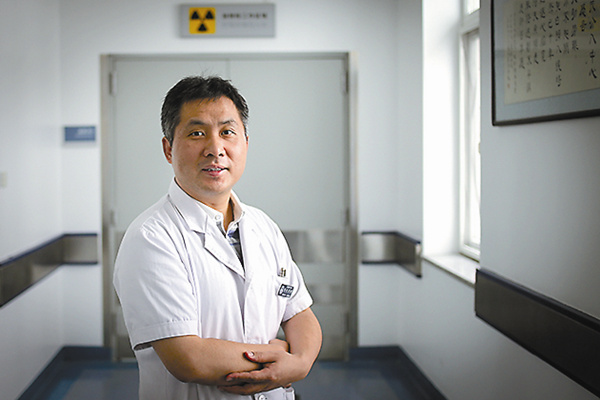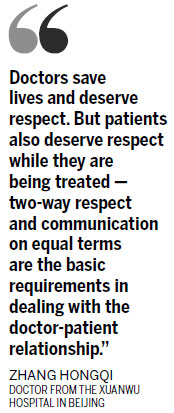

The Chinese Dream | Zhang Hongqi
As China makes good on President Xi's promise to dispatch medical teams to the Caribbean, we meet the man leading the charge.
Although he's one of China's best known and most respected neurosurgeons, Zhang Hongqi, who works at the Xuanwu Hospital in Beijing, is a remarkably modest, amiable and patient man.
 |
|
Zhang Hongqi undertakes a full surgical schedule and his clinic is always packed with outpatients, most of whom wait months to consult the eminent surgeon. Wang Jing / China Daily |
On Wednesday, the 44-year-old traveled to the Republic of Trinidad and Tobago as head of a 10-strong team that will provide medical services in the Caribbean island nation for six months.
However, the week before he left Beijing, Zhang undertook a full surgical schedule and his clinic was packed with outpatients, most of whom had been waiting at least three months to consult the eminent surgeon, who performed more than 600 neurological or spinal operations last year. "About 70 percent of our patients are transferred from other hospitals," he says.
During high school, Zhang was deeply interested in biology, and gradually came to believe that the human body is the most complex organism on the planet. "After four years' undergraduate study of basic medicine at the Peking University Health Science Center, I discovered that the human nervous system is extremely sophisticated. There are so many intriguing unknowns in this branch of medicine that I long to study and explore."
Long road, hard journey
But the road to becoming a neurosurgeon is a long one - undergraduate study, three years as a postgraduate student, three years working on a doctoral thesis, and then at least three years in the field. The long years of study are just the start of the journey, and the profession is an arduous and demanding one, involving long working hours and a great deal of stress.
On average, Zhang performs two operations a day, including on weekends, many of them related to cerebrovascular conditions and vascular malformation of the spinal cord.
A typical working day starts at 7:30 am, when Zhang attends a regular morning meeting at which the neurological staff reviews cases from the previous day and prepares for the coming day's operations.

"From 8 am, I make my ward rounds, including checking on 20 or so patients in the Intensive Care Unit, and arranging operations for the next day. Meanwhile, other members of the team, the surgeons, anesthetists and nurses, monitor the patients' conditions and head to operating rooms to conduct preparatory procedures, such as sterilizing the areas to be operated on and performing craniotomies - removing part of the skull to allow access to the brain - before the lead surgeons begin operating at about 10 am."
Zhang performs surgeries for most of the day, finishing somewhere around 8 pm, but is also required to be available at night to handle emergencies. "Sometimes, overnight surgeries will be done the next morning. So on the next day, whether to continue working or not, it depends on the workload and how I'm feeling. I have to assess if I have enough energy left to ensure that the surgery is as safe as possible," he says.
Neurosurgery is extremely meticulous and time-intensive work, because it requires precision cutting, sawing, drilling and clamping. Shorter operations take about four hours, but the longest can last about 20 hours, he adds.
In addition to his daily ward rounds, Zhang sees patients at his clinic during downtime in the operating rooms on Wednesday and Friday mornings, and also tutors a group of 10 interns.
Although Zhang is driven by the sense of achievement he feels after a successful operation, and by gratitude of the patients' families, the less-successful operations galvanize him the most. "I often recall them. I try to figure out the reasons and draw lessons from them," he said.
A new chapter
When we spoke, Zhang was looking forward to his trip to the Caribbean: "I'm very honored to have this opportunity because it's the first time that China has sent a medical team to a Caribbean nation. It ushers in a new chapter of cooperation in the field of health between China and the Caribbean nations.
"The mission is the fulfillment of a promise President Xi Jinping made when he visited Trinidad and Tobago in June," he says, referring to Xi's pledge that China would dispatch 100 medical specialists to work in the Caribbean countries in the coming three years.
According to a protocol the countries signed in February, China will send four teams to Trinidad and Tobago for a period of two years, with each team committed to a six-month tour of duty. Zhang's team is the first of the four.
"We will provide medical services and training in close cooperation with our counterparts from Trinidad and Tobago," he says, noting that while Chinese medics have already established a presence in many African countries, for countries such as Republic of Trinidad and Tobago, a member of the British Commonwealth, this will be a pioneering experience.
Speaking of the Commonwealth nations, Zhang recalled how the spirit of Norman Bethune, a Canadian surgeon who lived and worked in China in the middle of the last century, inspired him.
"More than 70 years ago, Bethune made light of traveling thousands of miles to China as the head of a medical team and taking care of wounded Chinese soldiers during the War of Resistance against Japanese Aggression. Now Chinese medical teams are going to commonwealth nations to bolster a tradition of friendship," he says, adding that before setting off to Trinidad and Tobago, he planned to visit Bethune's old residence in Tangxian county, Hebei province, in honor of this inspiring figure.
Working in the field
Despite his renown and privileged position at one of China's best hospitals, Zhang is no stranger to working in the field. When a devastating earthquake struck Wenchuan, Sichuan province, in 2008, he led the first medical relief team from Beijing to arrive in the disaster zone, where he worked with local medics, dealing with about 300 patients who'd sustained craniocerebral injuries.
Talking about his future plans, Zhang says he wants to develop ways of dealing with conditions that are currently considered untreatable, and to achieve better surgical results while minimizing risks and side effects. However, his overriding concern is to overcome the challenges inherent in the doctor-patient relationship.
"Doctors save lives and deserve respect. But patients also deserve respect while they are being treated - two-way respect and communication on equal terms are the basic requirements in dealing with the doctor-patient relationship," he says.
It will take time to improve things, and that will require policy support and construction of a new infrastructure to improve the environment in which patients see their doctors, he says.
He believes that doctors' pay should be standardized, because reasonable and transparent economic feedback would indicate respect for their knowledge and efforts. "Some doctors in public hospitals endure high workloads for meager pay. This can tempt some to earn 'gray income' by prescribing medicines from which they can get kickbacks.
"This can lead to things going badly wrong. All physicians and surgeons, no matter if they perform operations or see patients in a clinic, deserve decent payment for their specialist skills, both practical and intellectual."
Having practiced medicine in Morocco and Kenya, Zhang says doctors in Africa enjoy more respect than their Chinese counterparts. He hopes that his efforts and professionalism will help to build trust between patients and doctors, and improve conditions for both groups.
Contact the writer at dongfangyu@chinadaily.com.cn